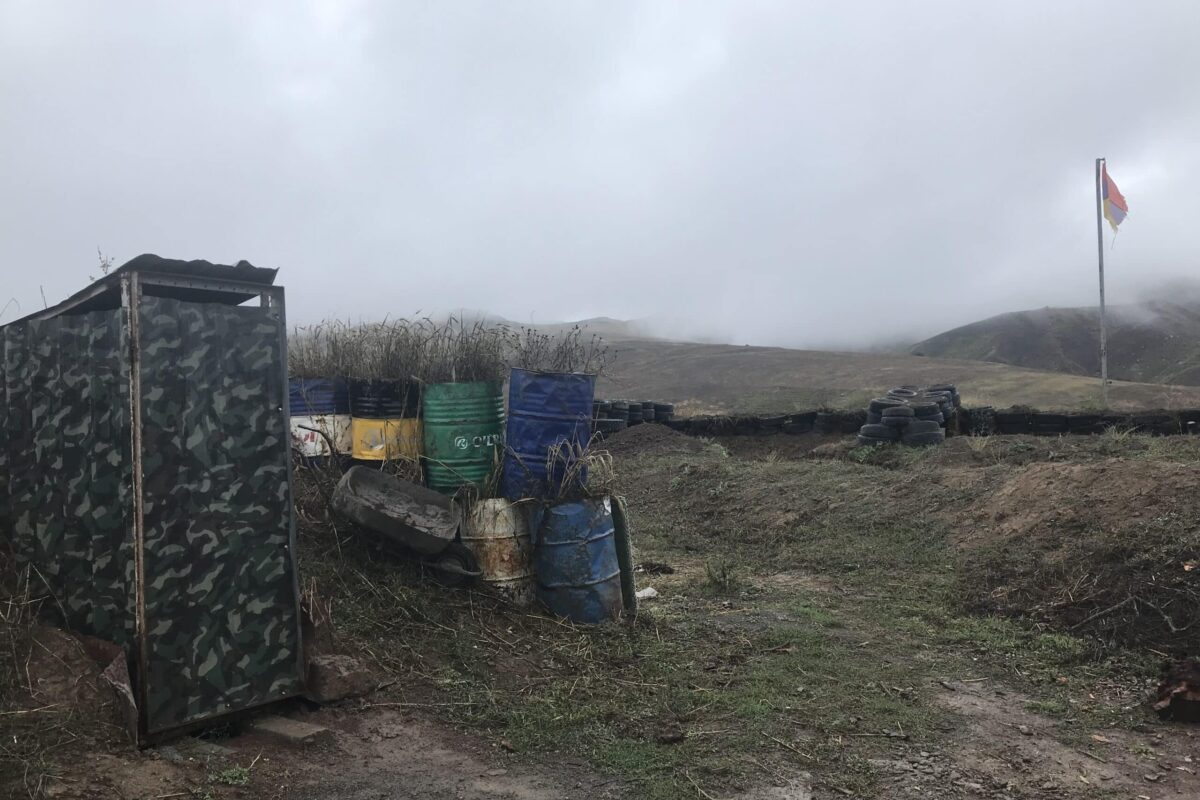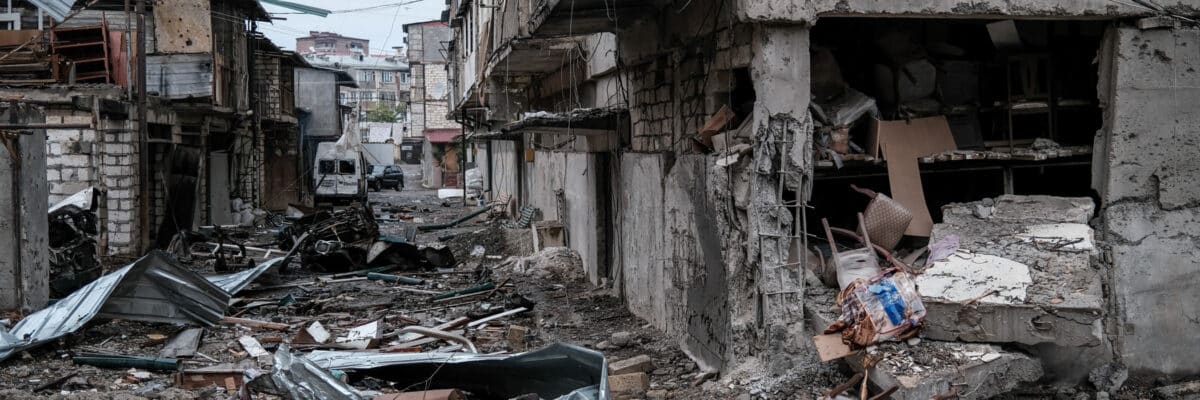Bring hope to forgotten conflicts

With the world’s eyes on US-Iran, we must not lose sight of what is happening in the South Caucasus. Conflict is brewing between Armenia and Azerbaijan, and could spiral if we continue to ignore it.
Intense fighting has ceased for now, but old rivalries run deep. Relations are very tense. I have seen for myself the digging of trenches along the shared border, where flags and fortified lookouts stake each country’s claim to the land.
On the Armenian side, residents voice fears about the possibility of another war. “We have a feeling,” says Narine, an 88-year-old farmer near Tegh, “that, one day, we might not reap what we sow.” An attack by Azerbaijan is a matter of “when not if”.
Narine’s fear is justified:
● She has witnessed two major regional wars in her lifetime, marked by territorial disputes and the uprooting of civilians.
● Just 30 miles north of Narine’s farm (we can see the mountains from her kitchen) 150,000 Armenians fled Nagorno Karabakh from 2020-23. Displaced families are traumatised. Their right to return is blocked.
● Many of her neighbours, in places like Aravus and Khnatsakh, are denied access to chunks of their own land, which is now under Azerbaijani control or within the line of fire along the volatile border.
● Locals report sporadic cross-border gunfire, though both governments deny armed actions. They accuse each other of spreading fake news, with claims and counter-claims about plans to start a new war.
Full-scale conflict within this decade is possible. Yet the world takes little interest. Most states beyond the region are either actively disengaged or passively indifferent. We see the warning signs but turn a blind eye.
There is no robust pressure, just generic calls for dialogue
The UK position is mixed. Politicians issue statements, occasionally, defaulting to phrases like: “…we urge all sides to refrain from escalatory actions” or “…we call on Armenia and Azerbaijan to return to the negotiating table.” There is no robust pressure to ensure accountability, just generic calls for dialogue.
It is a carefully maintained diplomatic posture. Neutral and non-committal. For as long as tensions in the South Caucasus do not escalate, then a passive stance is more-or-less justified. The logic being: we keep our distance to avoid making things worse.
- An outdated frozen-conflict mindset
Such diplomacy made partial sense from 1994-2019, when the conflict was frozen. Trouble simmered – with episodic skirmishes and a four-day war in 2016 – but fragile peace prevailed. Britain saw little need to get involved because worst-case scenarios were averted.
UK policy should have changed in 2020, when the conflict thawed. Azerbaijan no longer accepted the frozen status quo. With help from Turkey, it launched a devastating attack in the mountains of Nagorno Karabakh, deploying tanks, drones and helicopters to claim 80 per cent of the territory. Six weeks of heavy shelling displaced tens of thousands of Armenians.

Azerbaijan’s military offensive was followed by a nine-month blockade in 2022-23, preventing aid agencies like ours from delivering food and medical supplies. We warned at the time that the Armenian population of Nagorno Karabakh was on the brink of a humanitarian catastrophe. People were fainting in the streets from hunger.
The blockade culminated in a blitz military offensive in 2023. All remaining Armenians were driven out of Nagorno Karabakh. “Azerbaijan duly punished the enemy,” said President Aliyev in a victory speech. “I said that we would chase them, that we would chase them like dogs, and we chased them, we chased them like dogs.”
- An outdated tit-for-tat mindset
Aliyev makes no secret of further territorial ambitions. “Armenia as a country is of no value,” he says. “Present-day Armenia is our land.” Lake Sevan, Syunik and even the capital Yerevan “are our historical lands” and belong to Azerbaijan. His policy is fixed. Irredentist. Ultra-nationalistic. And (his words) anti-terrorist. Not too dissimilar from Putin in Ukraine.
Yet UK policy remains unchanged. Neutral. Tepid. Circumspect. British officials persist with a “both sides” narrative calling for “all parties” to de-escalate, as if Armenia and Azerbaijan are fighting a symmetrical battle, with comparable forces, where the lines of victim and aggressor are blurred.
Let’s be clear. Both sides have suffered. All should strive to reconcile. It is right to acknowledge the human cost and mutual hurt. But we must not become stuck in a pre-2020 mindset. This is not a tit-for-tat clash between similar-sized powers.
- Unequal power dynamics
Azerbaijan is the biggest and richest state in the South Caucasus. It has huge oil and gas reserves propped up by companies like BP. High revenues boost defence spending – a record $5bn in 2025, roughly three times greater than Armenia.
“Might is Right”, says Aliyev, “…the number one priority is to build up our military.” He is supported by Erdogan in Turkey, who supplied deadly TB2 drones in the 2020 war, and who backs plans for a new transport route (the controversial Zangezur corridor) to connect their countries through Armenia.
Armenia, by comparison, does not have close allies. Russia used to be its primary security guarantor, but not anymore – not since Russian peacekeepers failed to protect Nagorno Karabakh. Armenia now needs new friends, beyond Russia, to offset Azerbaijan’s growing strength. Maybe France. Maybe India. Maybe the EU or USA. In each case, there are opportunities for alliances but no guarantees.
The UK must be alive to this reality. The regional power balance has tipped. There is no equivalence between the warring parties. One side possesses superior resources and, in the event of escalation, is capable of inflicting disproportionate levels of harm.
- The window for peace is closing
Optimists place their hope in peace talks, which bring potential for some kind of normalisation between the two countries. Perhaps a return to fragile peace. Or, more realistically, a new normal in which Armenia cedes to unfavourable terms: land for peace.
Regardless, President Aliyev holds the cards. He negotiates from a position of strength. If talks fail (as they failed in 2020 and 2023) he can use the implicit threat of force, or actual force, to yield quick results.
It is in Britain’s interest to engage. Apathy is no longer an option.
War would devastate Armenia, with ramifications beyond the South Caucasus. The region sits below Russia and above Iran, the point at which Europe meets Asia and the Middle East. Its fate has momentous implications for global energy markets, trade routes and the broader security landscape.
- A proactive contribution to peace
It is in Britain’s interest to engage. Not by issuing vague calls for dialogue, and neither with reckless threats or inflammatory language. A new approach is needed. A middle way, built on three pillars:
● Assertive advocacy: An evolution of the UK’s current approach, away from a “both sides” narrative and towards visible accountability of evidence-based aggression. Apathy is no longer an option.
● Meaningful dialogue: Yes, bilateral talks between Azerbaijan and Armenia, but also involving the displaced people of Nagorno Karabakh. We should support initiatives to include them, such as the Swiss Peace Forum. Their voice matters.
● Strategic use of leverage: As the largest foreign investor in Azerbaijan, the UK is perfectly placed to draw clear red lines. We must press for the observance of international law, even when we are anxious to trade.
Remember Narine and her farm near Tegh. She is devoted to her family and land. She hates the idea of war. She longs for peace. She is also wise enough to know that events could spiral more quickly than we are currently prepared.
Sam Mason is CEO of Humanitarian Aid Relief Trust (HART) and former advisor in the House of Lords.
